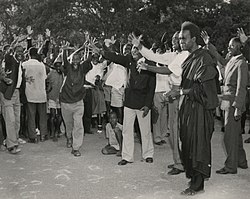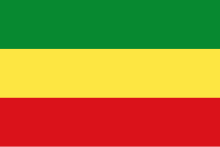Portal:Pan-Africanism/Selected article
Instructions
The layout design for these subpages is at Portal:Pan-Africanism/Selected article/Layout.
- Add a new article to the next available subpage.
- The "blurb" for each article should be approximately 10 lines, for appropriate formatting in the portal main page.
- Update "max=" to new total for its {{Random portal component}} on the main page.
Articles list
Selected article 1
Portal:Pan-Africanism/Selected article/1 Black Power is a political slogan and a name for various associated ideologies aimed at achieving self-determination for people of African descent. It is used primarily, but not exclusively, by African Americans in the United States. The Black Power movement was prominent in the late 1960s and early 1970s, emphasizing racial pride and the creation of black political and cultural institutions to nurture and promote black collective interests and advance black values.
Selected article 2
Portal:Pan-Africanism/Selected article/2 The Organisation of African Unity (OAU; French: Organisation de l'unité africaine (OUA)) was established on 25 May 1963 in Addis Ababa, Ethiopia with 32 signatory governments. It was disbanded on 9 July 2002 by its last chairperson, South African President Thabo Mbeki, and replaced by the African Union (AU). Some of the key aims of the OAU were to encourage political and economic integration among member states, and to eradicate colonialism and neo-colonialism from the African continent. Although it did achieve some success, there were also differences of opinion as to how that was going to be achieved.
Selected article 3
Portal:Pan-Africanism/Selected article/3 The Black Panther Party (BPP), originally the Black Panther Party for Self-Defense, was a political organization founded by Bobby Seale and Huey Newton in October 1966. The party was active in the United States from 1966 until 1982, with international chapters operating in the United Kingdom in the early 1970s, and in Algeria from 1969 until 1972.
At its inception on October 15, 1966, the Black Panther Party's core practice was its armed citizens' patrols to monitor the behavior of officers of the Oakland Police Department and challenge police brutality in Oakland, California. In 1969, community social programs became a core activity of party members. The Black Panther Party instituted a variety of community social programs, most extensively the Free Breakfast for Children Programs, and community health clinics to address issues like food injustice. The party enrolled the most members and made the greatest impact in the Oakland-San Francisco Bay Area, New York, Chicago, Los Angeles, Seattle, and Philadelphia.
Selected article 4
Portal:Pan-Africanism/Selected article/4

The Pan-African flag—also known as the UNIA flag, Afro-American flag, Black Liberation flag and various other names—is a tri-color flag consisting of three equal horizontal bands of (from top down) red, black and green. The Universal Negro Improvement Association and African Communities League (UNIA-ACL) formally adopted it on August 13, 1920 in Article 39 of the Declaration of the Rights of the Negro Peoples of the World, during its month-long convention at Madison Square Garden in New York City. Variations of the flag can and have been used in various countries and territories in the Americas to represent Garveyist ideologies.
Selected article 5
Portal:Pan-Africanism/Selected article/5

African nationalism is an umbrella term which refers to a group of political ideologies, mainly within Sub-Saharan Africa, which are based on the idea of national self-determination and the creation of nation states.
Selected article 6
Portal:Pan-Africanism/Selected article/6 Garveyism is an aspect of black nationalism that refers to the economic, and political policies of UNIA-ACL founder Marcus Garvey. The ideology of Garveyism centers on the unification and empowerment of African-American men, women and children under the banner of their collective African descent, and the repatriation of African slave descendants and profits to the African continent. Garvey was fought by the African-American establishment in the U.S. An investigation by the Justice Department, directed by J. Edgar Hoover, led to Garvey's arrest on charges of mail fraud in January 1922, and his projects collapsed.
Selected article 7
Portal:Pan-Africanism/Selected article/7


The Pan-African colours are: green, gold (not yellow, despite its appearance), and red (inspired by the flag of Ethiopia).
Red, black, and green are the colours of Black Nationalism, which should not be taken for a symbol of Pan-Africanism. It is often confused as such, given the political tendency’s support of Black self-determination.
Selected article 8
Portal:Pan-Africanism/Selected article/8 Négritude is a framework of critique and literary theory, developed mainly by francophone intellectuals, writers, and politicians of the African diaspora during the 1930s. Its initiators included Martinican poet Aimé Césaire, Léopold Sédar Senghor (the first President of Senegal), and Léon Damas of French Guiana. Négritude intellectuals disavowed colonialism, and argued for the importance of a Pan-African racial identity among people of African descent worldwide. The intellectuals employed Marxist political philosophy, in the black radical tradition. The writers generally used a realist literary style, and some say they were also influenced somewhat by the Surrealist stylistics. In 1932, the manifesto "Murderous Humanitarianism" was signed by prominent Surrealists, including the Martinicans Pierre Yoyotte and J. M. Monnerot.
Selected article 9
Portal:Pan-Africanism/Selected article/9 The Black Star of Africa is a black five-pointed star (★) symbolizing Africa in general and Ghana in particular. The Black Star Line, founded in 1919 by Marcus Garvey as part of the Back-to-Africa movement, modelled its name on that of the White Star Line, changing the colour from white to black to symbolise ownership by black people rather than white people. The black star became a symbol of Pan-Africanism and anti-colonialism. Described as the "Lodestar of African Freedom", the black star was used in 1957 by Theodosia Okoh in the design of the Flag of Ghana.
Selected article 10
Portal:Pan-Africanism/Selected article/10 African philosophy is philosophy produced by African people, philosophy that presents African worldviews, or philosophy that uses distinct African philosophical methods. African philosophers may be found in the various academic fields of philosophy, such as metaphysics, epistemology, moral philosophy, and political philosophy. African philosophy can also be defined as any epistemic endeavor that attempts to understand the world from an African perspective. It is therefore not just about Africa but about the world even if the location of the subject is Africa.
Selected article 11
Portal:Pan-Africanism/Selected article/11
African Democratic Rally Rassemblement Démocratique Africain | |
|---|---|
| Founder | Félix Houphouët-Boigny |
| Founded | 1946 |
| Dissolved | Around 1958 |
| Ideology | African nationalism Pan-Africanism Anti-colonialism Factions: African socialism |
The Rassemblement Démocratique Africain, commonly known as the RDA and variously translated as African Democratic Assembly and African Democratic Rally, was a political party in French West Africa and French Equatorial Africa which was important in the decolonization of the French empire. The RDA was composed of different political parties throughout the French colonies in Africa and lasted from 1946 until 1958. At certain points, the RDA was the largest political party in the colonies in Africa and played a key role in the French government headed by the Democratic and Socialist Union of the Resistance (UDSR). Although the regional party largely dissolved in 1958 with the independence votes for the colonies, many of the national parties retained the RDA in their name and some continue to do so. The political ideology of the party did not endorse outright secession of colonies from France, but it was anti-colonial and pan-Africanist in its political stances.
Selected article 12
Portal:Pan-Africanism/Selected article/12 The Pan-African Women's Organization (PAWO, Organisation Panafricaine des Femmes, (OPF)) was founded as the African Women's Union in 1962. In 1974, the organization changed its name to the Pan-African Women's Organization. It was originally formed as an organization to fight against colonialism and racial discrimination and allow women across Africa to unite in their efforts for gaining socio-economic equality. Independence and an end to Apartheid, shifted the organizational goals toward human rights and peace activism. It is currently headquartered in Addis Ababa, Ethiopia.
